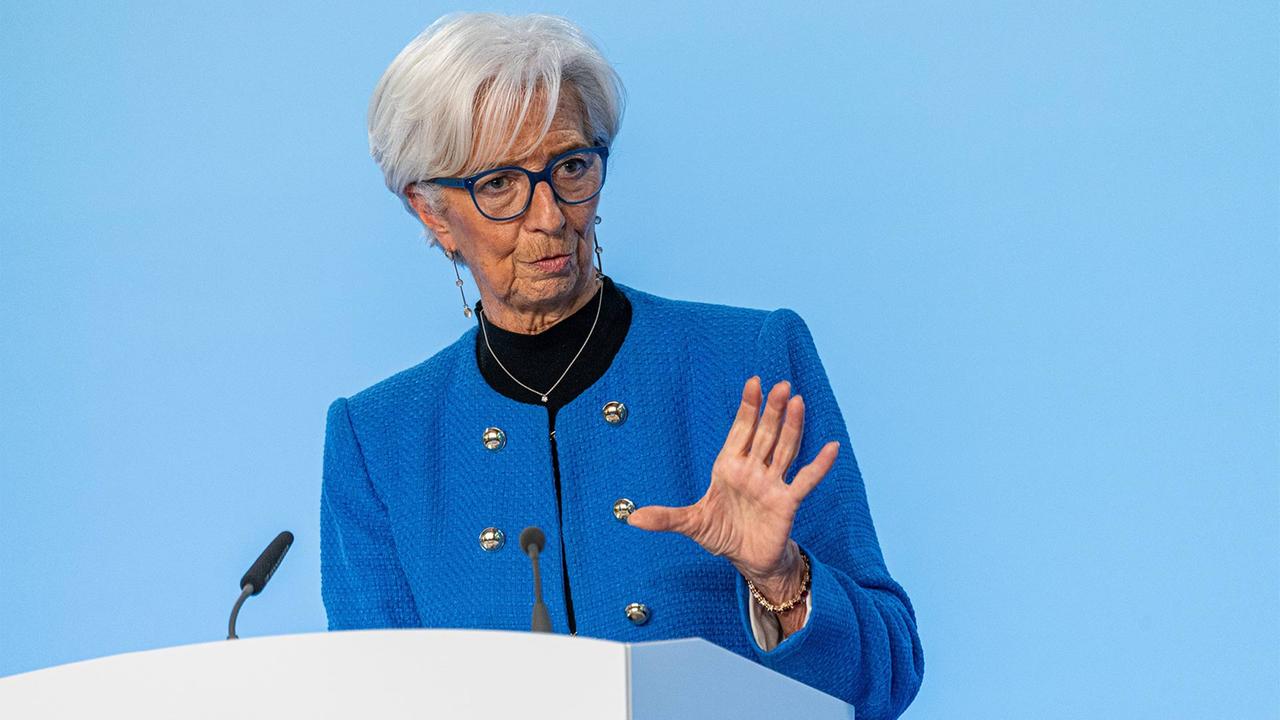The trade conflict triggered by Donald Trump also unsettles the European Central Bank. It calls for more unity in Europe and is likely to reduce interest again today.
The University College in Dublin is one of the leading universities in Ireland: five Nobel laureates, as well as many presidents and three presidents have proudly produced the largest and richest university in the country. Peter Sutherland, the former competitive commissioner of the European Union, who, through his commitment, significantly advanced the completion of the internal market. In honor of him, the time -honored college regularly forgives the “Sutherland Leadership Award”. This year he went to Christine Lagarde, President of the European Central Bank (ECB).
The Central Bank boss used her visit to the award ceremony in Ireland's capital, which always cleans up in the spring, to spread a core message: Europe had to use the dynamics of the change to advance a stronger and more united future “of the continent, Lagarde in her acceptance speech. Europe now has the opportunity to take a leadership role worldwide: “It is now time to act.” The dynamics of this change comes from the White House. The trade conflict triggered by US President Donald Trump and the massive consequences on the financial markets have also started the ECB.
Payment processing Is a patchwork
The ECB boss calls on the European member states to move together-and has one thing in mind: the completion of the European capital market union, for example in the area of digital payment processing. In times when electronic means of payment are on the rise and are now even more used in Germany than cash, Europe urgently has to act in order to decouple themselves from the dominance of American and Chinese providers.
The euro is now a legal means of payment in 20 out of 26 EU countries, but payment processing is a patchwork even in the euro zone. The Girocard system, which was popular in Germany for decades, has been abolished. In Spain, a handling tool called Bizum is widespread, which is almost unknown in this country. And in Italy own payment systems have never brought anything.
US providers dominate the market
In fact, US providers master the market: All credit and debit card providers (Visa, Mastercard, Amex and Diners) leading in Europe are American. The digital providers PayPal, Apple Pay and Google Pay too. And where the Americans leave gaps, Chinese competitors like Alipay push in.
Economists see serious dangers in it. If Trump instructs the US companies or put pressure under pressure not to fulfill their contracts or to increase the fees sensitively, Europe looks quite old. The only European payment method is called European Payment's initiative (EPI) and has been under the name Wero for customers since last year. Similar to PayPal, Wero can transfer money relatively easily and immediately via smartphone or online without needing an IBAN.
What will become of the “digital euro”?
But the system is still in its infancy: only 16 banks from Germany, France and Belgium have come together so far. The important Spanish institutes, who would have liked to bring in their payment system developed with a lot of money, have released themselves again after long negotiations. Other countries are also very hesitant for many customers Wero has so far not been a real alternative to PayPal and Co., where borders are irrelevant.
The ECB itself is also working on the project of the “digital euro”. It should become a legal means of payment and digitally handle the transfer of money – similar to that of cash. But there is still a lack of legal framework and the consent from the ECB council. He only decides in autumn whether the long -term project is finally being implemented. Even if this happens, years should pass for the digital euro US companies.
What does Trump come up with next?
Lagarde's demands are more of a future music. The question is much more urgent on how the ECB reacts immediately and at short notice to the artificial turbulence in business and financial world. High tariffs, resigning investments and faults on the stock and bonds meet the European economy at a time when the economy is already violently struck and the leading economies do not get going.
After the latest ECB survey, there are increasing number of banks to grant loans. The great uncertainty is on the European Economic and Monetary Union. Because nobody knows what the US president thinks next to send shock waves through the world of business.
Probably not a break
In view of this situation, especially southern European countries, whose financing costs in the form of higher interest rates are increasing again in government bonds, further drastic interest rate cuts. The idea indicated by the ECB in March to take a break after six interest rate cuts should be off the table. Accordingly, the financial markets are firmly calculated this week with further loosening: a reduction in key interest rates by 0.25 percentage points has already been priced in the stock exchanges. Some even expect a larger step of 0.5 percentage points.
Despite all the problems, there is no reason to panic – on the contrary. At the moment, the trade conflict is currently harmful to the USA. There the prices are attracting, there are likely to increase inflation and interest, where the economy is likely to be finally choked. Leading economists are based on a recession.
Lots of scope for the ECB
The euro area, however, benefits from significantly sunken oil prices at short notice, which continues to decrease inflation. The weakness of the dollar and the resulting strengthening of the euro makes European export goods expensive, but significantly reduces the imports, which also lowers inflation. In addition, China should soon flood the European market with cheap products, which were actually intended for the US market, but can no longer be stopped there because of the high tariffs. This in turn hurts the local industry, but delights consumers – because the flood of the goods should also press inflation.
The ECB would therefore have a lot of scope to further reduce interest in the long term in order to help the European economy. This in turn could boost the economy. In contrast, Gabriel Makhlouf, head of the Irish central bank, who also visited Lagard during her trip to Dublin, would not have anything wrong. The experienced central banker also warns of hasty steps: “The history of monetary policy shows us that rushed decisions are mostly wrong decisions.”





